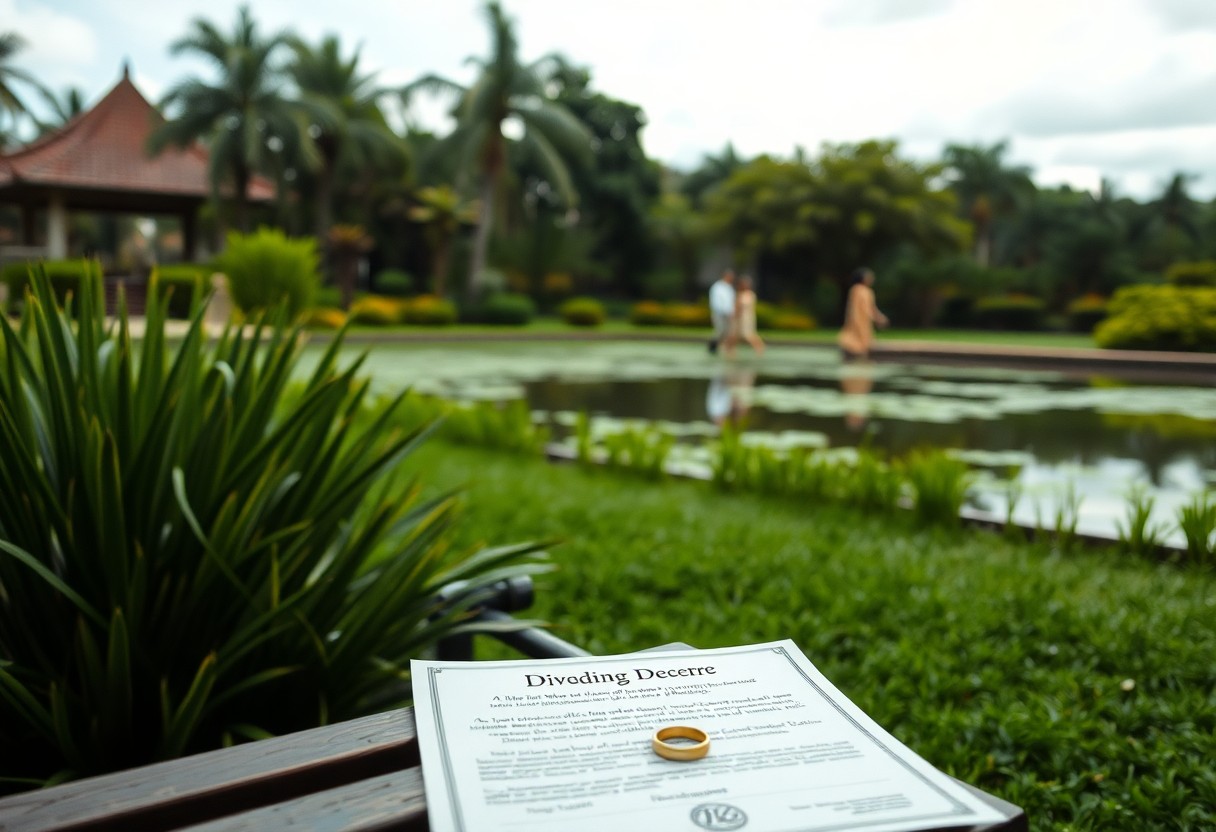With the complexities of divorce laws in Malaysia, you may wonder if you can remarry immediately after your divorce is finalized. The answer largely depends on your circumstances, including the type of divorce you undergo. You should be aware that if you are a Muslim, a specific waiting period called iddah applies, which can affect your eligibility to remarry. Furthermore, ensuring all legal requirements are satisfied is crucial to avoid complications in your new marriage.
Key Takeaways:
- In Malaysia, there is no mandatory waiting period for remarriage after a divorce.
- Individuals must obtain the divorce certificate before applying for remarriage.
- For Muslim individuals, the required waiting period (iddah) is typically three menstrual cycles or three months.
- Non-Muslim individuals are not subject to any waiting period regulations.
- Both parties must ensure all legal matters regarding the divorce are settled before remarrying.
- Marriage application can be submitted once the divorce is finalized.
- It’s advisable to consult a legal expert for any specific queries or complications related to remarriage.
The Legal Framework: Malaysian Divorce Laws
Malaysian divorce laws are governed primarily by the Law Reform (Marriage and Divorce) Act 1976 for non-Muslims and the Islamic Family Law (Federal Territories) Act 1984 for Muslims. These laws outline the procedures and requirements for obtaining a divorce, and each applies distinct provisions based on your religious background and jurisdiction. Understanding this legal framework is crucial to navigate your divorce effectively and prepare for any subsequent remarriage.
Conditions for Divorce
To obtain a divorce in Malaysia, you must meet specific conditions. For non-Muslims, the grounds include adultery, unreasonable behavior, desertion, or separation for at least two years. Muslims have similar grounds but may also invoke talaq (divorce) as per Islamic law. You must establish that the marriage has irretrievably broken down, providing sufficient evidence to the court.
Waiting Periods Before Remarriage
After a divorce, the waiting period before you can remarry varies based on your religion. Non-Muslims are generally required to wait for three months after the divorce decree is finalized, while Muslim women must observe a iddah period of approximately three months. This waiting period allows for any potential reconciliation and ensures that there are no outstanding claims or issues related to the dissolved marriage.
The iddah period serves multiple purposes, including ensuring that the wife is not pregnant from the previous marriage, thus clarifying parentage for any future children. During this time, you cannot remarry. For non-Muslims, the three-month duration begins after the final divorce order, allowing time for emotional adjustment and legal closure. Knowing these periods is crucial in planning your next steps post-divorce.

Cultural Perspectives: The Social Dynamics of Remarriage
In Malaysia, the social dynamics surrounding remarriage are influenced by a tapestry of ethnic customs and traditions. Different communities view remarriage through distinct lenses, impacting how individuals navigate this transition. Your choice to remarry could be met with support or resistance from your social circle, depending on prevailing cultural attitudes and the circumstances surrounding your divorce. Understanding these social dynamics can significantly affect your experience and decisions regarding remarriage.
Family Expectations and Norms
Family expectations play a pivotal role in how you approach remarriage in Malaysia. Many families uphold traditional views, where remarriage is often encouraged after a certain mourning period or personal healing time. Your family’s approval can contribute to your emotional stability during this process, shaping your outlook on future relationships. Balancing personal desires with familial expectations influences not just individual happiness but broader community relations.
The Role of Religion in Remarriage Decisions
Religion significantly impacts your decisions about remarriage, particularly within Malaysia’s diverse religious landscape. In Islam, specific guidelines govern remarriage, often requiring adherence to a waiting period known as ‘iddah’ after divorce. For non-Muslims, the approach may vary, but religious beliefs still shape attitudes toward remarriage. Understanding religious context is imperative as it dictates social and familial perceptions, influencing your choices and experiences.
In-depth, Islamic teachings provide significant structure surrounding remarriage, emphasizing respect and ethical considerations in relationships. For Muslims, the ‘iddah’ period spans three menstrual cycles or three months for those without cycles, aiming to ensure clarity regarding potential offspring and emotional readiness. This religious foundation helps you understand both the legal and moral imperatives tied to remarriage. Non-Muslim communities often look to their respective religious teachings, which may advise caution or provide alternative guidelines, thus impacting your approach to new relationships post-divorce.

The Emotional Landscape: Navigating Post-Divorce Feelings
Navigating the emotional aftermath of divorce can often feel overwhelming. Feelings of grief, loss, and even relief coexist, creating a complex emotional landscape. You may experience a rollercoaster of emotions, from anger to sadness, as you process the end of your relationship. Acknowledging these feelings is vital for your healing journey, allowing you to embrace change and discover new facets of yourself that were previously obscured.
Healing and Moving On: A Psychological Overview
Healing after a divorce requires a proactive approach to your mental health. Engaging in activities that foster self-worth and resilience, such as therapy or support groups, can facilitate moving on. Establishing a routine, cultivating new interests, and connecting with friends can significantly contribute to your recovery. Allow yourself the necessary time to grieve while actively seeking avenues for personal growth and transformation.
The Impact of Remarriage on Children and Family Dynamics
Remarriage can significantly reshape family dynamics, especially when children are involved. Children may struggle with feelings of abandonment or worry about loyalty to their biological parent. You may observe changes in their behavior or emotional well-being as they adapt to new family structures. Open communication and supportive environments are important in helping children navigate these transitions, ensuring that they feel secure and valued.
Understanding the impact of remarriage on children requires sensitivity and awareness. Research indicates that children who witness a supportive, loving environment in a blended family often adjust better than those in conflictual settings. Involving them in discussions about the new relationship and validating their feelings promotes a sense of inclusion. Establishing clear boundaries regarding relationships with biological parents while fostering positive interactions with stepparents can further smooth the transition and reinforce family cohesion.
Practical Considerations: Steps to Take for a Smooth Transition
Transitioning into a new phase of life post-divorce requires careful planning. Start by ensuring all divorce-related paperwork is finalized and obtain your divorce certificate. This document is vital for legal remarrying. Engage in self-reflection to understand your emotional readiness and consider counseling if necessary. Open communication with potential partners about your past experiences can facilitate healthier relationships. Lastly, surround yourself with a supportive network of friends and family to guide you through this change.
Legalities of Remarrying After Divorce
In Malaysia, you must wait a minimum of 3 months after your divorce before remarrying. This period allows for any legal issues to settle and ensures there are no complications regarding child custody or property division. Additionally, obtaining a certified copy of your divorce decree is vital for the new marriage application, which can be submitted to the appropriate authorities.
Best Practices for Entering a New Relationship
Entering a new relationship after divorce demands a thoughtful approach. Prioritize open communication about your previous marriage, expectations, and future aspirations. Take time to truly understand your partner’s feelings toward marriage and commitment. Maintain a balance between intimacy and personal space to ensure both partners feel secure and valued.
Additionally, be honest with yourself about your emotional state before committing to someone new. Engage in activities that foster personal growth and healing. Seek to learn from past mistakes without allowing them to overshadow future possibilities. Establish trust and set boundaries early on to create a strong foundation, ensuring you both align on relationship goals and aspirations.

The Road Less Traveled: Alternatives to Immediate Remarriage
Exploring alternatives to immediate remarriage can offer you the chance to rebuild your life with intention and clarity. Focusing on personal growth, establishing independence, and developing a deeper understanding of what you want in future relationships can prevent repeating past mistakes. Instead of rushing into another commitment, consider taking time to reflect, heal, and cultivate meaningful connections that may lead to healthier relationships down the line.
Co-Parenting and Single Life
Balancing co-parenting with single life requires a careful approach to ensure that your children’s needs come first while you navigate your own journey. Establishing a cooperative relationship with your ex-spouse can promote a stable environment for your kids. Prioritizing communication and shared responsibilities can alleviate stress and help you focus on personal happiness, ultimately benefiting both you and your children.
Exploring Personal Growth Before Committing Again
Delving into personal growth serves as a foundation for making better choices in future relationships. Engaging in self-reflection through journaling, therapy, or support groups helps you understand any patterns that contributed to your previous marriage’s challenges. Additionally, learning new skills or pursuing hobbies enhances your self-esteem and broadens your social interactions, preparing you for a relationship grounded in mutual respect and understanding.
As you journey through personal growth, set specific goals for yourself that transcend mere relationship readiness. Invest time in cultivating interests and building a supportive network of friends and family who uplift you. Exploring areas such as emotional intelligence, communication skills, and conflict resolution can significantly impact your future partnerships. Ultimately, you’re not just preparing for the next relationship; you’re ensuring that you can enter it healthier and more fulfilled, making the prospect of love far more promising.
To wrap up
Considering all points, in Malaysia, you can remarry immediately after your divorce, provided you have obtained the necessary divorce decree and fulfill any specific waiting periods set by your religion or local laws. It is crucial to ensure that all legal requirements are met and that you have a clear understanding of your marital status before entering a new marriage. Consulting with a legal expert may help you navigate any potential complexities in the process.
FAQ
Q: Can I remarry immediately after my divorce in Malaysia?
A: Yes, you can remarry immediately after your divorce is finalized in Malaysia. However, you must ensure that all legal procedures have been completed and the divorce certificate obtained.
Q: Is there a waiting period before I can remarry in Malaysia?
A: There is no mandatory waiting period for remarriage after divorce in Malaysia, but it is advisable to allow some time for emotional healing.
Q: What documents do I need to remarry after a divorce in Malaysia?
A: You will need your divorce certificate, identification documents, and any other relevant paperwork required by the marriage registry.
Q: Must I provide a reason for my remarriage in Malaysia?
A: No, you do not need to provide a reason for your remarriage after a divorce. The focus is on meeting the legal requirements for marriage.
Q: Are there any restrictions on remarriage after divorce for specific groups in Malaysia?
A: Certain religious or cultural groups may have specific guidelines regarding remarriage, so it’s imperative to check the regulations that apply to your situation.
Q: What should I do if my ex-spouse contests my remarriage?
A: If your ex-spouse contests your remarriage, it is advisable to seek legal advice to address any issues and clarify your rights regarding remarriage.
Q: Can I remarry in a foreign country immediately after my divorce in Malaysia?
A: Yes, you may remarry in a foreign country, but ensure you comply with the marriage laws of that country, in addition to having your divorce finalized in Malaysia.
